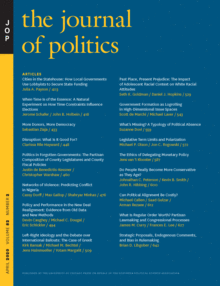Abstract: This article challenges a common understanding of the role that political disruption plays in promoting large-scale change. It argues that the most basic political work disruption performs is not to win public sympathy but instead to interrupt privileged people’s motivated ignorance. Drawing on examples from the Civil Rights and Black Lives Matter Movements, it makes the case that successful political disruption involves three steps. First, a group of political actors coordinates to withdraw cooperation from an epistemic power relationship, which enables motivated ignorance. Second, this act of epistemic disruption brings latent contradictions to the surface and forces members of dominant groups to take sides. Third, the resulting change in the political agenda enables subordinated actors to negotiate with the politically powerful. The article explains why disruption can be politically effective, even when it fails to win widespread public sympathy.


